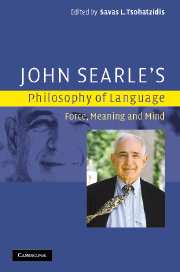Book contents
- Frontmatter
- Contents
- List of contributors
- Acknowledgments
- Introduction
- 1 What is language: some preliminary remarks
- PART I FROM MIND TO MEANING
- PART II FROM MEANING TO FORCE
- 8 How to say things with words
- 9 Semantics without the distinction between sense and force
- 10 Dynamic discourse semantics for embedded speech acts
- 11 Yes–no questions and the myth of content invariance
- 12 How do speech acts express psychological states?
- References
- Index
9 - Semantics without the distinction between sense and force
Published online by Cambridge University Press: 08 January 2010
- Frontmatter
- Contents
- List of contributors
- Acknowledgments
- Introduction
- 1 What is language: some preliminary remarks
- PART I FROM MIND TO MEANING
- PART II FROM MEANING TO FORCE
- 8 How to say things with words
- 9 Semantics without the distinction between sense and force
- 10 Dynamic discourse semantics for embedded speech acts
- 11 Yes–no questions and the myth of content invariance
- 12 How do speech acts express psychological states?
- References
- Index
Summary
INTRODUCTION
At the heart of semantics in the twentieth century is Frege's distinction between sense and force. This is the idea that the content of a self-standing utterance of a sentence S can be divided into two components. One part, the sense, is the proposition that S's linguistic meaning and context associate with it as its semantic interpretation. The second component is S's illocutionary force. Illocutionary forces correspond to the three basic kinds of sentential speech acts: assertions, orders, and questions. Forces are then kinds of acts in which propositions are deployed with certain purposes.
There are at least five reasons for positing Frege's distinction, which we can discern in Searle's Speech Acts (1969) and other writings:
R1: It seems we ought to analyze assertion in terms of belief: assertions are acts in which we utter sentences aiming to manifest our commitment to belief states. Belief states are truth-apt. Therefore, the primary truth-bearers are prior to assertion. Furthermore, beliefs are propositional attitudes, states that comprise an attitude component – characteristic of belief – and a content. It seems reasonable then to equate the primary bearers of truth with the contents of belief states, and to claim that these contents are propositions. Thus the content of an assertion involves two components: a propositional content – the object of the belief that the assertion is a manifestation of – and a force – the act type which is that of committing oneself to a certain belief.
[…]
Information
- Type
- Chapter
- Information
- John Searle's Philosophy of LanguageForce, Meaning and Mind, pp. 190 - 210Publisher: Cambridge University PressPrint publication year: 2007
